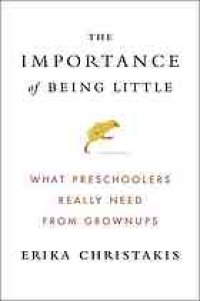
Ebook: The importance of being little : what preschoolers really need from grownups
Author: Christakis Erika
- Tags: Education Preschool -- Parent participation., FAMILY & RELATIONSHIPS / Parenting / General., EDUCATION / Preschool & Kindergarten.
- Year: 2016
- Publisher: Viking
- Language: English
- azw
Abstract: ""Teach your children well. It's easier to sing than do. Erika Christakis wants to foment a revolution in early childhood education, and with this deeply insightful, scientifically grounded, and utterly original book, she may just get her way." --Dan Gilbert, author of Stumbling on Happiness A bold challenge to the conventional wisdom about early childhood, with a pragmatic program to encourage parents and teachers to rethink how and where young children learn best by taking the child's eye view of the learning environment To a four-year-old watching bulldozers at a construction site or chasing butterflies in flight, the world is awash with promise. Little children come into the world hardwired to learn in virtually any setting and about any matter. Yet in today's preschool and kindergarten classrooms, learning has been reduced to scripted lessons and suspect metrics that too often undervalue a child's intelligence while overtaxing the child's growing brain. These mismatched expectations wreak havoc on the family: parents fear that if they choose the "wrong" program, their child won't get into the "right" college. But Yale early childhood expert Erika Christakis says our fears are wildly misplaced. Our anxiety about preparing and safeguarding our children's future seems to have reached a fever pitch at a time when, ironically, science gives us more certainty than ever before that young children are exceptionally strong thinkers. In her pathbreaking book, Christakis explains what it's like to be a young child in America today, in a world designed by and for adults, where we have confused schooling with learning. She offers real-life solutions to real-life issues, with nuance and direction that takes us far beyond the usual prescriptions for fewer tests, more play. She looks at children's use of language, their artistic expressions, the way their imaginations grow, and how they build deep emotional bonds to stretch the boundaries of their small worlds. Rather than clutter their worlds with more and more stuff, sometimes the wisest course for us is to learn how to get out of their way. Christakis's message is energizing and reassuring: young children are inherently powerful, and they (and their parents) will flourish when we learn new ways of restoring the vital early learning environment to one that is best suited to the littlest learners. This bold and pragmatic challenge to the conventional wisdom peels back the mystery of childhood, revealing a place that's rich with possibility"--
"A bold challenge to the conventional wisdom about early childhood, with a pragmatic program to encourage parents to rethink how and where young children learn best Parents of young children today are in crisis: Pick the "wrong" preschool and your child won't get into the "right" college. But our fears are misplaced, according to Yale early childhood expert Erika Christakis. Children are hardwired to learn in any setting, but they punch below their weight when "learning" is defined by strict lessons and dodgy metrics that devalue a child's intelligence while placing unfit requirements on the developing brain; we have confused schooling with learning. The race for good outcomes has blinded us to how young children actually process the world, acquire skills, and grow, says Christakis, who powerfully defends the preschool years as a life stage of inherent value and not merely as preparation for a demanding or uncertain future. This grounded, sensible book offers a ray of light in a dim and frantic world--with the message that before we can teach our youngest children, we must better understand them. In The Importance of Being Little, Christakis explores what it's like to be a young child in America today, in a world designed by and for adults. With school-testing mandates run amok, playfulness squeezed, and young children increasingly pathologized for old-fashioned behaviors like daydreaming and clumsiness, it's easy to miss the essential importance of being a young child. She provides meaningful solutions through a forensic analysis of today's whole system of early learning, from pedagogy and science to policy and politics. "